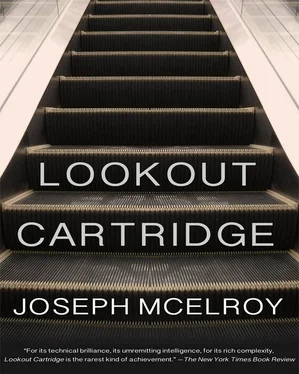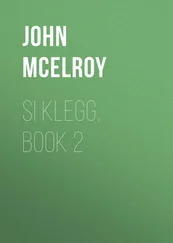Joseph McElroy - Lookout Cartridge
Здесь есть возможность читать онлайн «Joseph McElroy - Lookout Cartridge» весь текст электронной книги совершенно бесплатно (целиком полную версию без сокращений). В некоторых случаях можно слушать аудио, скачать через торрент в формате fb2 и присутствует краткое содержание. Год выпуска: 2014, ISBN: 2014, Издательство: Dzanc Books, Жанр: Современная проза, на английском языке. Описание произведения, (предисловие) а так же отзывы посетителей доступны на портале библиотеки ЛибКат.
- Название:Lookout Cartridge
- Автор:
- Издательство:Dzanc Books
- Жанр:
- Год:2014
- ISBN:9781941088036
- Рейтинг книги:3 / 5. Голосов: 1
-
Избранное:Добавить в избранное
- Отзывы:
-
Ваша оценка:
- 60
- 1
- 2
- 3
- 4
- 5
Lookout Cartridge: краткое содержание, описание и аннотация
Предлагаем к чтению аннотацию, описание, краткое содержание или предисловие (зависит от того, что написал сам автор книги «Lookout Cartridge»). Если вы не нашли необходимую информацию о книге — напишите в комментариях, мы постараемся отыскать её.
Lookout Cartridge — читать онлайн бесплатно полную книгу (весь текст) целиком
Ниже представлен текст книги, разбитый по страницам. Система сохранения места последней прочитанной страницы, позволяет с удобством читать онлайн бесплатно книгу «Lookout Cartridge», без необходимости каждый раз заново искать на чём Вы остановились. Поставьте закладку, и сможете в любой момент перейти на страницу, на которой закончили чтение.
Интервал:
Закладка:
Tessa and the film — not just parts of one’s life sensing one another in that spirit of exhilaration called manic in someone deranged. Yes: Tessa and, in particular, the Marvelous Country House. But in the abbreviated form in which Lorna began but then was kept from finishing my section, the link with Tessa may be clear only to me. And what I now tried to tell the person who sat beside me, her soft dry hand half-closed in mine, was part what she’d read, part what she hadn’t reached, and part what I added out of courtesy. I looked at her — at all except her eyes, the governing powers of her face which gave person to her bones, though in themselves those eyes if you forgot everything else and saw only them were impersonal, both mechanically animal for all their flecked textures, and wildly opaque — and then I looked right at two things in our room as if I could look at them both at once — and thinking of Tessa and the tiny fold at the inner angle of each of her eyes, I thought why didn’t I include in my account of Tessa’s connection with the film these two things. One is a cigarette burn in the northwest quadrant of our carpet. The other is a jagged blue-green hunk of rock salt Tessa brought from the Bavarian Alps when she at last brought herself to visit Germany in 1963.
The second came to us accompanied by the remark that this was the color Tessa had wanted her eyes to be instead of watery pale brown. I pointed out that in black and white her eyes looked blue. She said Dudley had told her to buy herself some of these new colored contacts, just as he had once told her to go ahead and get another cat — she smiled and shook her head, and Lorna said, You don’t wear glasses, and Tessa said, I’d rather long for the eyes than have the contacts, it isn’t that Dudley misses the point, he gets the point but he thinks why say so, though he’s probably right that the rock salt must have come from Saxony, not where we were.
Tessa’s cigarette burn occurred in 1970, just a year before Dagger and I began shooting. She would hold her cigarette for a minute or two as if she’d forgotten it, then take a deep stabbing drag and as if in the same motion sweep her cigarette away and tap it — but this time she tapped off a sizable coal, but more interesting than what it did to the carpet was her interest in what it did, the calm, the objectivity which in me and in Lorna and in three others in the room seemed to come from Tessa’s — we sat and watched the spot smoke and settle out into a smudge of burnt nap and as if it were a nostalgic winter blaze or a hypnotic peephole we looked and looked until Lorna laughed and said, Tessa you bloody cow!
Beside me on the newly resprung couch as I troubled to show Tessa’s place in the Marvelous Country House, Lorna seemed now incapable of such a frank outburst.
Why did you read the diary?
I thought it was about time.
I listened for Jenny who was still upstairs. After Reid had seen me across the street in Knightsbridge he might have told Jenny (no doubt also saying Don’t look) — and now she was not sure what to do next. But I was sure I had to settle with Lorna before going on. Celibacy was one thing in Manhattan, another in Knightsbridge.
Lorna shook her head but held my hand. She wondered what the three moments I’d put in had to do with the film, and she said even if Will hadn’t surprised her in the dark house and she’d read through the second and third of these “moments,” she still would not have understood.
In the first of these moments, I come home to find not Lorna alone at stove or piano or with Jenny or Will, but at the kitchen table with Tessa, who taps ash onto a blue willow-pattern plate in the center of which is an uncut red-waxed Edam cheese. Someone has just said something; I think Lorna. Smiling silence ensues because of me. It might be just Her Beloved Man Arrives, but I don’t take it quite that way. Lorna pours me a drink from what’s left of the bottle. Dagger got me the case. Lorna doesn’t ask how things went in Liverpool. Tessa now continues, and I’m stupidly thinking, Tessa is English, what the fuck am I doing here — dumb things to think when you are dealing with a mind and body as tenuously demanding as Tessa’s. Yet she was German. And her mother had been Rumanian, and the shape of her eyes was east of Rumania.
So to make a long story stop (she says), my uncle woke up blind — woke up being blinded — and never saw the dawn of that day, and he was, as I’ve already told you, unaccustomed to opening his eyes before ten in the morning. But to the day of his death he was as filled by the dreams he had just before waking as if the new house they entered several years later had been really the house he’d dreamt of that night — which was only one of his dreams asleep in that bed before the accident — as influenced as if he’d been seeing that future home and thinking about it just as he was (say) killed — and dying seemed never to end but to be an endless continuation of that. So there. That’s immortality: just concentrate hard enough when you’re dying but you have to know you’re dying. Uncle Karl still dreamed, of course. But the dreams that night were to him like the last things he saw.
Tessa rested. It was precise and seductive. But I did not ask for what I had missed of the story. How, for instance, had her uncle been blinded? Which uncle was this one? Most of her uncles were cousins or old refugee friends of her father. Had a burglar groped her uncle’s eyeballs?
Dud ley (she said) had said that it merely showed how we must keep our eyes open as it might be our last look. But, picking up her intonation though I still hardly knew Dud ley, I asked did she mean Dud ley had no real right to this truth he spoke. And Tessa at once said, Anyone has a right to it, don’t you think? I said enforcement was one thing, right another, and no I didn’t think just anyone had a right to it, her story was a good one, I said, I’d once dreamt I was making love to Lorna and woke up and I was — but she was only just beginning to wake up.
Tessa said, Maybe you’re the one that needs the shrink.
Tessa’s uncle I said must have been able to find his way around that house he later bought even better than his wife or whoever he was living with, even though he was blind and they weren’t.
Tessa at once said, Ah but you’ve hardly a right to that yourself, having not heard the whole story; and she put her cigarettes in her bag, put a hand on my wife’s wrist, and said, as if in thanks: Lorna.
But I had already risen. I said I was tired and hungry and was going up to wash my hands. Tessa murmured, Americans are so explicit, as if she didn’t know me pretty well. Jenny called me overhead as I put a foot on the stairs, and Lorna called that there was shepherd’s pie in the fridge, and Tessa said — just audibly — You know your place, darling, and Lorna said, I do not.
There had been a nasty pale brown cigarette mark on the cheese plate. I thought, Tessa is a European, she would not normally think of eating cheese with an apéritif, much less Dutch cheese.
The second “moment” described in my film diary, because it seemed to me to bring Tessa into the Marvelous Country House, was in Tessa’s flat. In her bedroom. And it should have been no more difficult for Lorna seven years later sitting on our resprung couch holding hands to understand why I’d associated that moment with my film, than it was for me to guess why Jenny still did not come down from her bedroom even though she must be curious why I’d come back from New York like this.
The second “moment” is 1964. Tessa packs her third or fourth suitcase, stops to add to a list for the Belgian couple who are going to be living there with her pictures and furniture for the next year while she and Dudley and Jane are in New York. She is into her packing, but in her references to Dudley she makes me feel she is more waiting for him (for he and Jane are not here) than packing for America: Lorna on the bed curled around a corner of the suitcase Tessa is filling: I upright in a straight chair holding a peculiar grayish stone that was on the night table on a Michelin Guide to New York City — and Tessa asked me to feel it and see if I liked it, and when I grinned stupidly at her she said, Go and take it.
Читать дальшеИнтервал:
Закладка:
Похожие книги на «Lookout Cartridge»
Представляем Вашему вниманию похожие книги на «Lookout Cartridge» списком для выбора. Мы отобрали схожую по названию и смыслу литературу в надежде предоставить читателям больше вариантов отыскать новые, интересные, ещё непрочитанные произведения.
Обсуждение, отзывы о книге «Lookout Cartridge» и просто собственные мнения читателей. Оставьте ваши комментарии, напишите, что Вы думаете о произведении, его смысле или главных героях. Укажите что конкретно понравилось, а что нет, и почему Вы так считаете.












